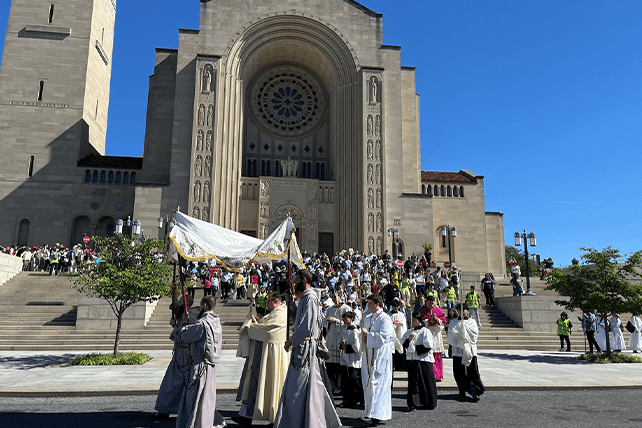Crookston, Minnesota, Bishop Andrew Cozzens, chairman of the board of the National Eucharistic Congress, has cited declining Mass attendance as an important reason a Eucharistic revival is needed, saying that if Catholics felt they encountered Jesus in the Eucharist, they’d be attending Mass weekly.
That seemed to be the experience of the 10 attendees of the Washington procession who spoke with Religion News Service, all of whom expressed deep devotion to the Eucharist and involvement in the church.
“I cannot do without the Eucharist,” said Appolonia Nnesolu, who took an hourlong train ride from Gaithersburg, Maryland, to attend the procession. Nnesolu said she attends Mass before work on weekdays, where she can “bow to Jesus in the Eucharist,” and “he can take me to work.”
Madelyn Sequeira, a University of Southern California college student working as a summer intern in D.C., said she was inspired after going to the SEEK conference to begin attending Eucharistic adoration, or prayer in the presence of the consecrated host, almost every day.
“It renews you with a joy that you cannot even begin to describe,” said Sequeira, who called her newfound devotion “life-changing.”
Sequeira, like a few other attendees, said she was involved in anti-abortion advocacy, which the U.S. bishops have defined as their “preeminent priority” politically.
Catholics at the Washington procession said they hoped the revival would counteract the lack of young people in the pews. “I have been praying that the youth will return to God because a lot of the youth of today have left the church,” said Dorothy Roxas, who also said, “It has been scientifically proven that (the Eucharist is) not a symbol, but it is the muscle of the heart of Jesus.”
Roxas, a mother of six, said that none of her children continue to go to Mass. The National Eucharistic Revival website cites not only low rates of Mass attendance and belief in the real presence of Jesus in the Eucharist, but also rising numbers of unaffiliated millennials as reasons that the revival is needed.
But surveys indicate there are problems beyond beliefs about the Eucharist. About 4 in 10 adults under 30 are religiously unaffiliated, no matter their family’s faith. And while a 2023 poll from the Public Religion Research Institute found 70% of unaffiliated people raised Catholic had left because they stopped believing Catholic teachings, 53% of them said they stopped identifying as Catholic due to “negative religious teaching about gay or lesbian people.” Another 45% cited clergy abuse scandals.
Nonetheless, the large number of young Catholics at Saturday’s procession cheered older adults in attendance. “It’s very important for people to see a young church,” said Eiyack Cacho, who is part of more than 150 young adults who gather at St. Ann’s in D.C.’s Tenleytown neighborhood on Tuesdays. “That the youth is active in the church, that we have found the sacraments, that we have found the Lord,” he said.
Cacho said he hoped the revival would motivate a church in D.C. to open a perpetual adoration chapel, a concern for young adults in his group who cannot participate in Eucharistic adoration during normal church hours.
The Rev. Brendan Glasgow said he brought his youth group to the pilgrimage to see “the church” and a “Catholic expression of faith.”

